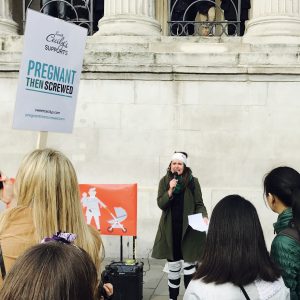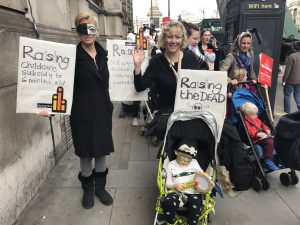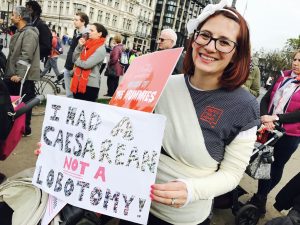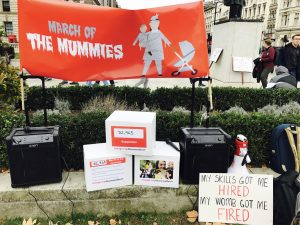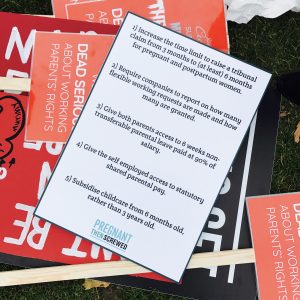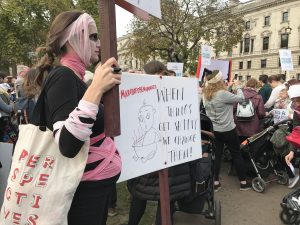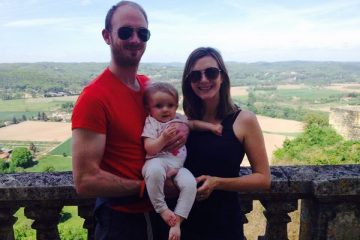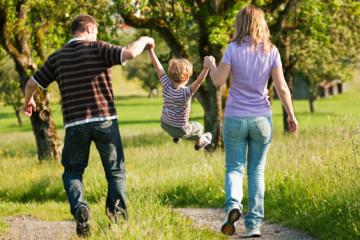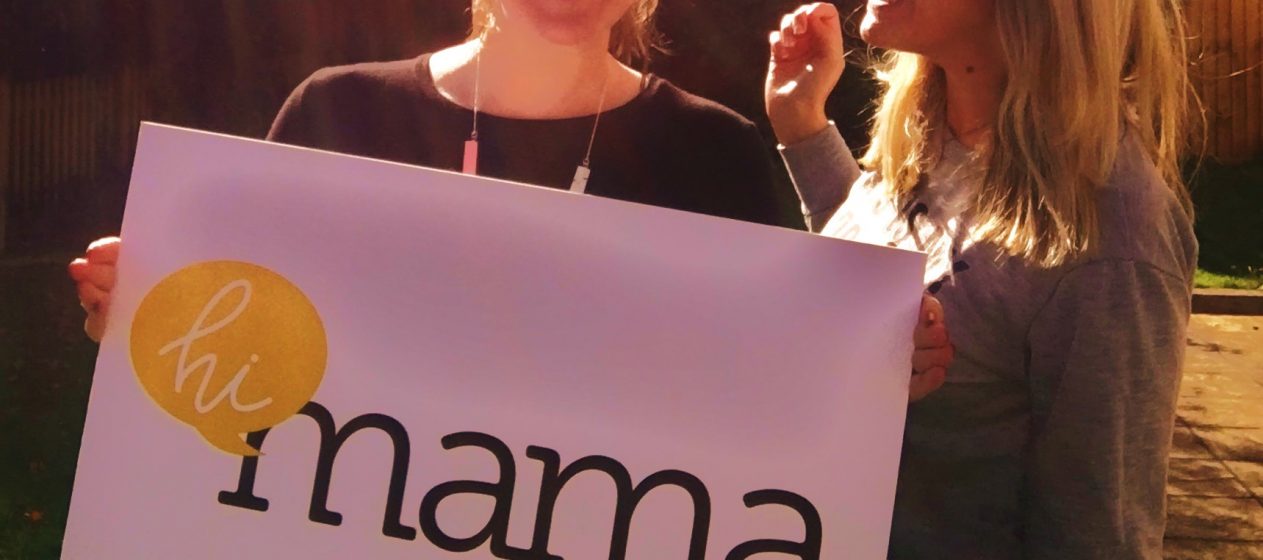
The Mumbelievables: Sophie and Shelley of Hi, Mama
When secondary school friends Sophie Taylor and Shelley Lawrence set-up hi mama earlier this year and invited me to be part of the amazing virtual space they were creating, I knew I’d love to invite them onto the Mumbelievables interview series. They’ve created a strong, sisterly and uplifting space for mothers to share strength and solidarity through letters written by mamas to themselves and anyone is welcome to contribute to the project by writing their own letter.
Sophie has a little boy, Felix, a funny old pug called Tammy and is married to Stuart. She started working as a runner for a television production company in Brighton and now works in communications for the police.
Shelley is mama to two fiercely spirited girls, which her mum calls payback. Shelley and her husband James lived and worked in Sydney together before returning home to start a family. Shelley has worked in Events and Marketing for 14 years, spending the last 7 years as a freelancer.
It’s such a pleasure to get to know them a little better here and I love their advice about useless boys and getting into unmarked cabs when travelling! You can check out the letters at www.hi-mama.co.uk and if you’d like to contribute to hi mama by writing a letter to yourself, you can find all the details for submitting here.
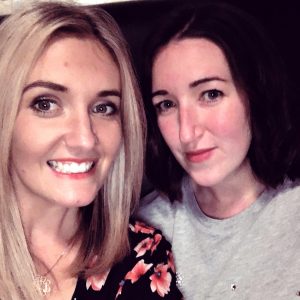
Who are you? What’s your story?
Hi! We are secondary school friends Sophie and Shelley and we set up hi mama in September. hi mama is a digital library of letters written by mothers to themselves and we are so proud of the start it’s had. We wanted to create something that offered solidarity to mamas everywhere and we are in awe of the openness and honesty that the letters have been written with so far.
If someone else was to sum you up in five words, what do you think those words would be?
Shelley: Summing Sophie up I’d say… Kind, intelligent, thoughtful, sensible and fun
Sophie on Shelley: true, honourable, beautiful, funny and bright.
How do you feel about yourself now compared to before you became a mum?
Shelley: Becoming a mum has made me a lot more aware of my need to set an example. With two girls looking up to me, I’m determined to show them that they can be anything they want to be.
Sophie: I know myself a lot better now and feel much more confident and sure of the decisions I make. In a way it has freed me up to do more – only after I got through the challenging first year though!
If you could go back in time, what advice would you give your younger self?
Sophie: Teenage Sophie; don’t waste your heart on useless boys. Early twenties Sophie; that free bar won’t run dry, so no need to drink like a fish. New mama Sophie; you’ve got this.
Shelley: I’d tell my 23 year-old self how proud I am of her for deciding to go travelling on her own after an awful event, she was the start of a much more confident me. So I’d tell her to keep going, keep exploring, stay strong. But maybe don’t get in unmarked taxis in Thailand, looking back that was a bit silly.
What does confidence mean to you?
Shelley: Confidence for me is an ever evolving thing. Some days I have it, some days I don’t.
Sophie: Having faith in myself – it’s not there every day and some days it can take me ages to even decide what to wear but it’s getting better with age!
What advice would you give to someone who doubts herself?
Shelley: No advice from me. All I can say is that I personally listen to that doubt, digest it, maybe talk it through with my husband or friends and work out how to overcome it. I try to acknowledge and own my doubts and insecurities so they don’t own me.
Sophie: I’ve always had times when I doubted myself, in fact today I have momentarily doubted a decision I’ve made. But you know when something is right or wrong and if you doubt it, it probably isn’t right.
What’s the most important lesson you’ve learned in your life so far?
Shelley: Don’t compare yourself to others. Take your own path.
Sophie: Totally agree with Shelley!
And finally, where is your happy place?
Sophie: Hove beachfront on a sunny day with my husband, son and pug.
Shelley: On our sofa, all four of us with treats and a film. Bliss.
You can follow the hi-mama project on Instagram @hi_mama_letters; Facebook @himamaletters and Twitter @hi_mama_letters.

Five things we can all do to make change happen at work
Earlier this month I spent a couple of days at an amazing event in London – Stylist Live. The first day I was there was Equal Pay day, so loads of the sessions I went to were about careers, combining work and life more successfully, confidence, knowing your worth, gender pay issues and the future of work.
It was inspiring, reassuring, empowering and most of all, brilliant fun to be in a space with so many great women all pulling in the same direction.

One session left a huge impact on me (other than the one with Alice, Jamie and James from My Dad Wrote a Porno, which was EPIC), and it centred around equality at work and how every single one of us can make change happen within the companies we work with and for.
It can often feel as though, unless we’re in a position of influence within a company that we’re powerless to make change happen and every time I share anything about what businesses can do to get better at supporting parents I get a lot of messages and comments all with the same common thread: “If only.”

I thought I’d share what I heard from the phenomenal panelists (Emma Codd, Head of Talent at Deloitte, Sam Smethers, CEO of the Fawcett Society and Helene Reardon-Bond from the government’s action team on gender pay – pictured as the post image above) at that session here so that more of us can do these things that will help organisations move towards a more equal way of working when it comes to behaviour and treatment of each other, pay, opportunity and culture.
Here’s what we can all do…
- Share your ideas with people of influence. If you think things should be different where you work, do some research about some viable alternatives and approach the person or team who could make it happen. If your company isn’t great at supporting parents, a great resource to check out is the Equality and Human Rights Commission’s Working Forward initiative which has tonnes of free resources for businesses.
- Call out bad behaviour, if you can be brave enough. Find a senior sponsor who will support you if that helps.
- Know your worth and value your experience. Don’t allow yourself to be mugged off or placed into a position which doesn’t suit your skills and level of experience.
- Talk about pay openly. Transparency and openness is how change will happen.
- Look at who you can influence. Be a role model for junior employees and future generations.
It’s all too easy to moan when things aren’t right. But these are several things we can do no matter who we are, where we work or what we do.
Our kids will thank us for it.

We came, we marched
Today thousands of men and women marched across six UK cities to advocate for better support for working parents.
It was a serious feat by the amazing Pregnant Then Screwed team and after some awesome rallying by some truly brilliant women including Caroline Lucas Helen Skelton Mother Pukka the energy was electric.
This morning Tim asked me what it was all about. I explained the five (VERY REASONABLE) demands (check them out here: https://www.marchofthemummies.com) which I feel really strongly about.
But more than that, today for me was about the recognition that our individual voices can come together to make things better. As I’ve got older I’ve realised that my voice matters and that I can make a difference.
I want Xav to feel like that from the get go.
I want him to know that his mum saw that things weren’t right and instead of just shrugging her shoulders and getting on with her life, she did something constructive to help the situation and that he can do the same.
Above all, I can’t be apathetic. I can’t take the chance that others will act so that when Xav and all our kids enter the world of work and if they decide to procreate, they’ll experience the same uphill battle, prohibitive conditions and expensive childcare that so many parents face now.
Here’s the thing: It’s not rocket science. It’s about encouraging businesses to be more human, so that their people can work better, smarter and ultimately everybody wins. What’s not to love about that?
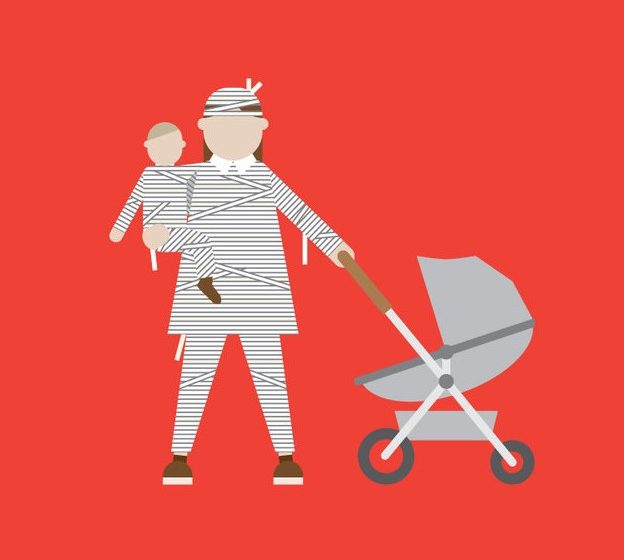
March of the mummies – tomorrow across the UK
Tomorrow, thousands of us will march in London to demand recognition, respect and change for working parents.
Why is this so important?
54,000 women a year are pushed out of their job for getting pregnant and 77% of working mums endure negative or discriminatory treatment in the workplace. These numbers have almost doubled in the last 10 years.
Motherhood is also a key contributor to the gender pay gap with women who have had children by the age of 33 earning 15 per cent less than their peers who remained childless.
Women even face discrimination for simply having a womb with 40% of employers saying they would avoid hiring a woman of childbearing age. The Government knows these statistics, they commissioned the research report, yet they have taken no decisive action to better protect and support mothers.
Since the report was released, 84,500 women have been pushed out of their jobs for daring to procreate.
The main demonstration will start on Trafalgar Square and we will march to Parliament Square where we will present MPs with these 5 demands for change:
1. Increase the time limit to raise a tribunal claim from 3 months to (at least) 6 months
2. Require companies to report on how many flexible working requests are made and how many are granted
3. Give both parents access to 6 weeks parental leave paid at 90% of salary
4. Give the self-employed access to statutory shared parental pay
5. Subsidise childcare from 6 months old, rather than 3 years
MARCH OF THE MUMMIES
TOMORROW, TUESDAY 31ST OCTOBER
12PM
TRAFALGAR SQUARE, LONDON
Register your free place here:
https://www.eventbrite.co.uk/e/march-of-the-mummies-tickets…

What it’s really like to be a mum recovering from an eating disorder
Recently I put a quick post up on the Mumbelievable Facebook page to ask if anyone might find it helpful if I wrote about what it’s like to be pregnant and become a mum when you’re someone who has suffered from an eating disorder.
Writing about this subject in general has been something that has been on my mind for years, because writing is part of who I am.
But writing about it from the perspective of a person on the way towards the elusive perceived-utopia of recovery who has to deal not only with her own body and mind but that of a developing foetus and then a small dependent child is a context I hadn’t considered; until recently.
(As a hilarious aside, two very good friends messaged me and asked if I was pregnant which made me both laugh and simultaneously question my grasp of the English language as my wording had obviously been a bit misleading!)
I’ve been floored by the reaction to that post.
Beautiful, courageous, stronger-than-they-know women have contacted me to ask me to share this part of my story.
More of them than I could count saying that there’s not enough openness, honesty or similar experiences from people who have been affected by eating disorders being shared – online or offline. So many of them saying that when they’ve looked for others who may have written about their illness, they’ve not found much at all they could relate to.
When I put the idea out there that day, it was a small brain dump triggered by a conversation with a great friend who has also been affected. We’ve discovered this ‘thing’ we have in common really recently and she suggested that writing about it might help others in the same way as we have both needed (and continue to need) to be helped.
It’s niggled away at me since. So in a moment of abandon/courage/I’m not really sure what…I hit ‘publish’.
And now I feel like I’m kind of committed.
As I write this, I’m not too sure how it’s going to pan out. I feel like there’s a book’s worth of words I could write about the parts of my life that have been impacted by my eating disorder.
But I also want to focus on the perspective of pregnancy and motherhood, because that’s what I said I would do and if sharing my thoughts on this helps one woman, that’s more than enough for me.
There’s just so much to say. I’ll try and keep it as concise as I can, but brevity is not my goal here.
I send my love to everyone, male and female, who has been affected by this destructive, unforgiving group of illnesses. No-one will ever know the magnitude of your strength. You are extraordinary.
What you’re about to read is simply my account of what has happened to me. It’s mine and it will be different to everyone else’s. I did what was right for me, but that won’t be the case for everyone and in no way am I qualified to offer advice about how to deal with this nightmare. We all just have to do what’s right for us. And when we do, we deserve nothing but compassion and support. No judgment.
I thought that when I sat down to write about this stuff the words would tumble onto the pages and flow easily. I feel as though all of this has been swirling around inside me for years.
But the reality is pretty much the opposite of that, which is why there have been a couple of weeks in between the first part of this series of posts and now.
I’ve been trying to work out why this might be, and I think I’m starting to understand my hesitations in getting this done.
During the years I was at my worst and pretty ill, I chose for my battle to be quite private. Very few people knew what was happening. Just Tim (husband) and a few people close to us. I chose not to involve my family as the years beforehand had been pretty tough on everyone and I felt that it was the least I could do to protect them from worrying about me.
Because that’s what we do, isn’t it?
Protect the people we love at all costs.
I just couldn’t bring myself to admit to them that I was struggling, suffering and exhausted – permanently. I couldn’t find the words or the right time to bring them in to my world to that extent. I couldn’t bear the thought of them thinking of me as weak, even though I knew they would never judge. Above all else, I didn’t want to let this evil thing become the definition of me.
I still haven’t opened up to them, really. I can’t bear to cause them the pain of knowing it all.
Why couldn’t I just get over it? I berated myself about this constantly.
I’m lucky enough to be capable, intelligent and well-educated so in my mind it was up to me to reason my way out of this mess. At the time I still believed that it was all in my head. That I was ultimately the one who was in control.
When in actual fact, nothing could have been further from the truth.
Tim showed me the most extraordinary and apparently limitless compassion, patience and understanding throughout those years when I stubbornly refused to seek any help. He must have found it so excruciatingly frustrating that I just couldn’t accept that was what needed to happen because I was adamant that I could sort this out myself.
Because in my mind, I was causing it.
I genuinely thought I was deciding to punish my body by starving it on the absolute bare minimum. That I was making a conscious choice to exercise to the point of passing out and feeling some warped sense of victory when I could keep going, even then. That I had absolute control over the decision to make myself sick when I did allow myself to eat (even if it was just an apple) because of the debilitating fear of putting on weight, and because my stomach was so accustomed to being empty.
That was genuinely how I felt. That this was something I could stop, if I tried hard enough.
I don’t remember what actually triggered me into accepting I had a problem. There were so many rock-bottom moments that it’s hard to remember the one that actually meant there was no way back. But once I’d admitted it, I read a million books and researched every bit of information I could get my hands on about eating disorders.
And then I saw what I had thought was just in my warped little head was an actual THING. My thoughts had somehow been taken out of my head and put down on paper by someone else. It wasn’t just me. I had an illness. A weight lifted. This wasn’t my fault. I wasn’t in control of it. The opposite was true. It was in control of me.
It had begun after we got back from our honeymoon in June 2007. To this day, I don’t really understand why it was then. I’d lost quite a bit of weight (completely healthily) for the wedding. I find it ironic that that was when a few people asked Tim if I was ok, before there was a problem. His reply? That if there was, he would know.
But he didn’t. Because an eating disorder makes its captive a master of deception.
All of a sudden, it’s like your moral compass is broken or even, at times, gone altogether. I thought nothing of lying about having already eaten at work, having had a big lunch and not being hungry or eating later. All in the name of avoiding eating whenever I bloody well could get away with it.
That I was capable of such a level of deception still haunts me to this day. It made me hate myself and having written these words down the feelings of shame are flooding my body. It is a vile feeling and once again I’m reminded how far I have come since those days when the shame ate me alive – dictating my every move. That’s probably why one of the things I value most about myself today is that I am honest.
I felt like a fraud to everyone. I lived with a mask on my face every single day, because I so desperately wanted to feel normal. I wanted to be the confident, bubbly and energetic person everyone was under the illusion they knew but I was drowning in a sea of self-loathing and anger at myself for not being able to kick this thing.
It felt like I was an outsider within my own life. Always on the outskirts, never quite making into the centre of the action. I was present, but absent – if you can understand what I mean by that.
Somehow I managed to keep the mask in place enough to build my career, securing an amazing job and getting promoted twice in the space of a few years. I loved my work, and it was an honour to be part of a once-in-a-lifetime team of people.
I struggled internally to keep up with the pace of my busy life which was over-complicated by my obsessive, time-consuming need to work out before work, during lunch time and after work – sometimes all on the same day. This was non-negotiable.
I struggled externally with the physical impact of my illness. I regularly had chest pains, heart palpitations, dizziness, pins and needles, numb feet, headaches, split lips and a sore throat. I covered the burst blood vessels on my face and my dull, under-nourished skin with make-up.
I would cry on my way to work while I sat in traffic, worrying myself sick about how on earth I was going to get through the day. I would cry in the toilets at work when I should have been at a meeting where food was provided, because I couldn’t face anything there and I wished I could just be like everyone else in the room who clearly wasn’t a complete basket case.
At home, I’d rigidly control what we ate and suddenly developed an obsessive interest in cooking which I later found out is very common among eating disorder sufferers. When we ate out, I’d have to know where we were going so I could stalk the menus days in advance and decide what the safest thing to order was going to be. I often made excuses as to why I couldn’t go out to eat or would simply just not order anything.
My eating disorder consumed me, quite literally.
It exhausted me to my core, and demanded more of me than anything else I have ever known.
I had so much to live for though, and the fight in me to be better never waned. I could have succumbed to this beast so easily. I could have slipped further into the abyss of my illness but I refused. My life was worth fighting for. It had the potential to be out of this world, if only I could overcome this disease.
Our future was worth fighting for. We saw children in it one day, but one thing I would not compromise on was that I would get better before we entertained that. I couldn’t risk passing this on. My body wouldn’t have been able to get pregnant anyway.
Several years down the line, I was labelled with terms such as ‘high-functioning’ and ‘unrelenting high standards’ by my psychotherapist. At the time though, I was just a pawn in the cruellest game of chess led by the master of my life, my eating disorder.
With Tim’s boundless love and help, I desperately tried to fix myself. I decided to force myself (forcing myself is the most accurate way I can describe it. It went against all my instincts) to eat three meals a day, because that was what normal people did.
I wanted to be normal more than I have ever wanted anything in my entire life. I ached to have just one day when I was relieved of the ever-present thoughts that swirled around my head metaphorically beating the crap out of me.
I decided there would be no more lies and that if I was going to get better, I had to be honest to myself and to the people who love me. That was, and remains one of the hardest parts. Again, the shame was crushing.
I ate nourishing foods such as Innocent food pots (now Bol foods) which are pure vegetables and are low calorie but great for you. I knew I was in this for the long game, but I figured that if I knew I was putting good food into my body the temptation not to eat it (or to get rid of it afterwards) would be reduced.
Believe me, hand on heart – I tried. I fought for a good three years after I actually admitted that I had an eating disorder to get myself better. Without any help other than Tim’s unwavering belief in me.
I’ve wished a million times that I could go back in time and help myself to get to that point a bit quicker. It was too big. I just couldn’t do it on my own.
Realising that took all my strength, but rather than it being something that weakened me it was one of the best decisions I have ever made.
So there it was, in the cold light of day. I couldn’t do ‘this’ on my own. I needed outside input to start my recovery from a debilitating eating disorder.
I’d been ‘defeated’.
But had I?
In my mind up until the point I accepted I wasn’t getting very far very fast, if I couldn’t sort out my recovery and gain control over my eating disorder myself, I’d have failed. I’d have been too weak.
But in actual fact, the realisation that the time had come to accept this wasn’t going to happen and that I did need to seek some help was unexpectedly liberating.
I think one of the lowest points was forcing myself into work one morning and collapsing early on in the day. I’d felt completely awful but that was nothing new. I just powered through. I’d already done a DVD workout before work and not eaten a thing, and I remember it being mid-morning. I just couldn’t stay conscious any more. My vision started to blur, and I felt myself falling.
When I came to, I had no strength or inclination to hide it any longer. I’d confided in one of my colleagues who had become a close friend so she knew I was ill, but no-one else did. And out it tumbled. The shame I felt had forced me to hide it from them, but they were incredible. The support and love I felt as they called Tim and we waited for him to come and get me was tangible. I guess there was a bit of an intervention that day.
We got an emergency doctor’s appointment and I had some blood tests. He told me I was quite underweight, which I shook off and dismissed as ridiculous because I have a petite frame but, if I’m completely honest I did that because to me – quite genuinely – there could be no such thing.
I went home to bed. I’d hit a massive wall and couldn’t really remember a time when I’d felt that unwell.
It turned out that my liver was shutting down.
This was major. And still, my overriding concern was that because I was resting (and not exercising), I’d be putting weight on. Not that this was a potentially life-threatening health risk that had begun because my eating disorder had got so terribly bad.
Not long afterwards, I started a new job. A dream job, with a dream team in an organisation I would have bled for. I was happier. My previous job (where liver-gate happened) had been a very stressful, unsupportive and tense environment so this was such a change and I think that combined with having a boss I trusted was a catalyst to me finding the right time to approach the idea of proper help.
I’d been suffering intensely for around three years at this point.
I spoke to my boss and spilled about my situation. I had no option. If I was to receive treatment as an outpatient, I’d need to take time off regularly during work hours to go to the appointments.
Reaching out to people took more courage than I felt I had within me, but it paid off. I hated the idea that she would think less of me because of my mental health issues. I feared she would think me less capable and would trust me less at work.
I wasn’t prepared for her reaction, which was pure compassion. This amazing woman sat there and said the most beautiful things to me about the courage it had taken to talk to her, and offered whatever support I needed to get better.
So it began. First with an assessment (one of the most gruelling things I’ve ever had to sit through – my shame was palpable and I couldn’t even take my coat off, I felt so intensely vulnerable) followed by The Diagnosis (equally mortifying), followed by a recommendation for Cognitive Behavioural Therapy (CBT) at a local private hospital. I was so fortunate to have healthcare cover with work.
CBT isn’t a magic bullet, in my opinion. And this is all just that – my opinion and experience.
I took some gems from it that paved the way for me to progress in a huge way with my recovery, but it wasn’t The Answer. It was a powerful catalyst for me to begin to challenge the way I thought about and treated myself though, so perhaps it’s possible that it offered me more long-term than I realised.
Roy, my psychotherapist taught me this, which changed the way I think about many things in my life: that you can’t reason your way out of an emotional state.
I can’t really believe I hadn’t realised that before. It seems like such a simple concept, but this was revolutionary for me because it enabled me to start to understand my thoughts a bit better, and also my reactions to my thoughts.
Perhaps to become a bit more present and aware of the thoughts I was having, which I guess is the first step towards regaining some degree of control over how we react and respond to our thoughts, rather than signing over exclusive rights to all control over to the thoughts themselves.
He taught me to treat myself with more compassion, and to ease up on myself by showing me that the standards I set for myself were unachievable so I was doomed to failure unless I challenged my own expectations.
My weight does not equal my worth became my inner mantra. A bit of an affirmation. I didn’t say it out loud or anything, but I had to find ways of reprogramming my fear around what imaginary catastrophes would happen if I put weight on.
I truly began to accept that my eating disorder was all about control for me, and that it was possible to take back the power. I started to feel like it might be possible to feel different. It wasn’t immediate, but at that point even a glimmer of hope was so big, I can’t even describe how empowered I felt – just by that remote possibility.
I’d started to feel as though life could become different, and that this might not get the better of me. That I might not always be all-consumed by this disgusting beast. That I might wake up one day and not feel as though the risk of giving in and just letting it take me as it wanted to was so high.
Roy helped me to understand that this was a permanent thing. It was never going to go away. My recovery is and will always be ongoing.
This took the pressure off me to reach this seemingly unachievable utopia of the ‘normal’ I sobbed for at night. My idea of ‘perfect’ did not exist, and once he impressed this upon me – along with the fact that my recovery would always be a work in progress that required constant supervision and maintenance – I relaxed. This was transformational for me.
The pressure for recovery to be final is immense and unreasonable. Or at least, it was for me.
Accepting that this was part of my tapestry and understanding that the hard days didn’t equate to failure was oddly freeing. Permission was granted to begin again the next day, and the only pre-requisite was that I must try (not succeed, necessarily, just try – there’s such a huge difference between the two) to be kinder to myself.
My relentless perfectionism was not doing me any favours – just damage. Just because you have a bad day, it doesn’t mean you’re losing. It takes more strength to recover from those days and keep pushing towards the future you want than it does on the days it comes easier.
Perhaps the biggest and most enduring gift that Roy gave me was this: we must behave the way we want to be. And this goes for all of us, in every area of our lives.
For me, this meant being religious and committed about wanting to follow what I was being taught. To get out of bed on the days when I wanted to pull the duvet over my head and shut out the world. To force myself to eat three meals a day, and to do my best to regulate my exercise.
I chose not to take medication. I was offered it many times, but didn’t feel it was right for me. This was my personal choice and I’m not sure I would make the same decision today, knowing what I do now. I know and love many people who have been helped immeasurably by medical intervention. We all just have to do what it right for us.
Slowly but surely, the shackles loosened.
Fast forward a couple more years, and I was finally edging towards a place I’d previously thought just didn’t exist.
Above all else, I wanted to get better for Tim and for our future. The idea of having a family and potentially risking passing on my issues was more terrifying than I could every articulate. I had so much to live for.
Along with my eating disorder diagnosis, I was also told I was afflicted by the rather catchily-titled Acute Body Dysmorphic disorder. In a nutshell, what I saw when I looked at myself was distorted. Even at a bit under seven stone what I saw may as well have been morbidly obese.
Once I’d got to the stage where I no longer felt like I was in the permanent, unending grip of my illness, and my body began to return to normal – whatever that means – we decided to try to have a baby.
This in itself was a massive step; I’d been adamant that I would never pass on my crazy. As I’ve said before, I had so much to live for. Getting better was for my many incredible relationships (my marriage, especially), for my army of family and friends and for our hypothetical child.
But how I saw myself hadn’t changed. I still loathed my reflection. So I was petrified of how I’d respond to becoming pregnant and my body expanding. I read stories and chatted online to women who said they found being pregnant freed them from their eating issues because their bodies were nurturing a life. I hoped against hope that would be how I felt.
It didn’t happen straight away, but when I found out I was pregnant we were over the moon. We weren’t sure we’d be lucky enough.
I used all the tools I’d picked up since my recovery began in all the books, online research and forum chats and from my psychotherapist during my CBT. The pivotal message to myself was this: behave like the person you want to be.
Behave like the person you want to be.
As hard as I tried to gag it though, I couldn’t escape that my brain still had those dark thoughts.
On many days I could ignore them, which made me feel amazing. I ate well. I nourished that tiny baby. I trained twice a week with a PT and together we designed an appropriate exercise programme I could follow to prepare my body for the later stages of pregnancy and labour.
But I also trained at least two or three more times a week in the gym or at home by myself. I was overcompensating because of how hungry I was. I was starving, permanently. An insatiable hunger that needed all the carbs. There’s no way to escape the fact that I exercised compulsively while I was pregnant, as much as I’m ashamed to admit it.
I knew I had to reign it in, but I was terrified that if I didn’t offset the extra food with exercise that I’d go the other way and revert to starving myself again. I knew that option was far worse, so this was how I managed the situation. It was far from perfect, but it was how I dealt with it at the time.
On the days I didn’t eat enough (and on a very few occasions made myself sick) I hated myself. I dismissed myself as a terrible, unfit mum who obviously didn’t love the unborn baby inside me enough to be resolute about being healthy for him, if not for myself.
I was so cruel to myself, especially on those days. Why wasn’t that precious life inside me enough to make me forget all of this and focus on what was best for him?
Because it’s impossible to reason your way out of a mental illness, that’s why.
We’ll never know why he was premature, but I’ll never stop wondering whether I had something to do with it. That’s guilt I’ll carry forever. Did I somehow cause his sensory issues? Have I given him the struggles he has? As pointless as it is, there will always be a part of me that tortures myself because I don’t know the answer. I hope not. I hope that the way I fought to be healthy while I was pregnant was enough for him. Because that precious child deserves the world.
I hated myself at the time for not being able to be miraculously fixed for this unborn baby. But I don’t any more. I’ll always feel the guilt, yes. But that’s just part and parcel of being a mother, isn’t it? I’ve forgiven myself for the fact that I wasn’t able to suddenly ‘snap out of it’ and be 100% healthy while I was pregnant. I did the best I could.
I can swear that all the way through. I did my best, every day. And that’s why I’m here now, writing this.
It turned out that beautiful baby, along with his heroic daddy, would save my life. He fixed what was broken and gifted me a life free from the confines of the life that came before it.
Tim saved my life more times than I could count. He showed me that love has no bounds. He protected me, challenged me, persevered with me, cried with me, and loved me when I was unlovable.
Xav changed everything when he was born. Suddenly I understood how I fitted in to the universe, and that overtook everything else. I was finally better. For real. I was happy. I know I’ll never be completely free of my illness, but I also know that back then, before he was born, I had absolutely no idea how incredible it would feel. I didn’t dare to believe – or even hope, if I’m honest – that it could be possible to feel so free and alive.
This (above anything else I’ve said in this series) is what I hope more than anything will reassure you, if you’re reading this and can relate to it. The other side does exist, as impossible as it may seem right now. It’s there, it’s waiting for you and I swear it’s worth every single second of the fight.
My recovery has been tested several times, but never to the extent that it was when Tim was ill. When he had his kidney transplant quite suddenly in August 2015, we all went into shock. True to form, my appetite disappeared. My stress response was right there, trying to show me a way that I could control the uncontrollable.
I had no power over how the surgery went, whether the kidney would work, whether Tim would recover from this.
The me of a few years ago might well have fallen into its familiar grip, but I promised myself a long time ago that I WILL NEVER, EVER GO BACK THERE. I have seen what life can be like on the other side. And it is so beautiful. I love living without the darkness suffocating me.
Every day, I will fight for the light to remain.
So I forced myself to eat again, as I had when I was recovering myself a few years earlier. I felt sick with panic and worry for months after Tim’s transplant, as he fought complication after complication.
I lost weight, and believe me, I liked it. My anorexic brain will always revel in a perverse sense of accomplishment when that happens. I’ve accepted that’s always going to be the way.
I ate anyway, and flicked the finger to the shitty goblin on my shoulder goading me to listen to it. I talked about how I felt, and about how easy it would be to slip. Being honest with myself about this is how I got to where I am.
If my recovery can remain intact through that, I’m confident I can get through anything and still stay true to my promise to myself to never go back.
Creating the energy (when you have none) to appear as though you’re fine when you feel like a little piece of you is physically dying inside is exhausting. Trying to be the person you’re so desperate to be, while feeling like the world’s biggest fake is unspeakably draining. This is what it means to have an eating disorder. I will never forget how it felt every day to suffer like that.
Looking back it was pure hell, and I know what the phrase ‘depths of despair’ means. But I look back from a position of strength and personal peace.
I worked harder on my recovery than I have on anything else in my life, and I fought like hell to get better. The contrast I have now when I stop and appreciate how free I am today compared to back then is a beautiful thing. I’m grateful for it, and I wouldn’t change a thing.
I’m lucky this happened to me, and that I had the support and love to overcome it and tell this story in the hope that it can show others who are suffering that pushing yourself to the absolute limit in the name of reclaiming the life that you deserve is more than possible. The world is so vividly colourful now, and the simplest of beauties that were lost on me back then seem so much more special now. That’s a privilege, and I’ll never see it as anything else.
I now have control over how far I slip down the slope. And I like the view from the top, thanks.



